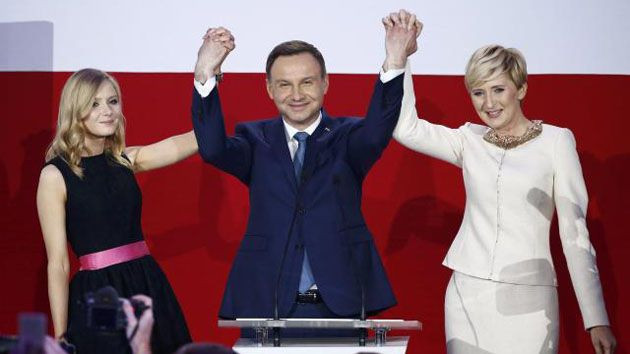Polish Presidential Election: A New Wind on the Baltic Coast
(Baonghean) - Preliminary poll results after the second round of the presidential election in Poland showed that conservative candidate Andrzej Duda of the Law and Justice Party received 53% of the votes and became the winner. Although the official results will not be announced until May 25 (local time), incumbent President Komorowski has admitted defeat in this election. This result is considered a big shock in Polish politics and will affect relations in Europe.
According to the Polish Constitution, the Prime Minister is the head of the Government, but the President, who serves a five-year term, is the head of the military, has a say in foreign policy and has the power to pass laws. Therefore, it is likely that Poland will see many changes when newly elected President Andrzej Duda takes office. This may also cause the European Union to reconsider some of its previous plans.
 |
| Mr. Andrzej Duda (center) celebrates with his wife (right) and daughter after the results of the voter survey were announced, just leaving the polling station, in the second round of the Polish presidential election, held on May 24, 2015. Photo: Reuters |
First of all, it can be said that the reason for Mr. Andrzej Duda's victory is probably because the election platform focused on social issues, committed to increasing spending on social welfare... For nearly a decade under the leadership of the Civic Forum party, high unemployment, unequal living standards, weak social welfare... are factors that make Polish people feel tired and expect change. Therefore, Mr. Andrzej Duda - a young politician, not yet famous but has twice defeated incumbent President Komorowski in the last two rounds of Polish presidential elections. There are still about 5 months to go until the Polish parliamentary election, in which Mr. Andrzej Duda's Law and Justice party can "defeat" the current ruling coalition of the Government of Prime Minister Ewa Kopacz - an ally of incumbent President Komorowski or not is still unpredictable. However, according to analysts, Mr. Andrzej Duda's victory this time is clearly a big advantage for the Law and Justice party in the upcoming race to the Polish Parliament.
The change in the Polish presidency will likely have an impact on Poland’s relations with the EU and Russia. Under President Komorowski, the Civic Platform has pursued a strong rapprochement with Germany and the EU. This has been the cornerstone of Polish foreign policy and is increasingly important for the EU. However, Andrzej Duda has made no secret of his intention to adjust relations with Germany and distance himself from the EU. Duda has stressed “national sovereignty” and advocated a more robust Central European approach. This approach will undoubtedly worry the EU.
In addition, Mr. Andrzej Duda and the Law and Justice party are known for their pro-NATO and tough foreign policy towards Russia. Before running for election, Mr. Duda called for NATO to establish a military base in this country. As an important country in Central and Eastern Europe, Poland is the only country bordering both Russia and Ukraine. The Ukraine crisis has had a strong impact on Polish politics and has also strained Russia-Poland relations. Mr. Andrzej Duda even expressed his desire to send Polish peacekeeping troops to the Donbass region in Ukraine. Analysts say that Poland's already tense relations with Russia under President Komorowski are now at risk of becoming even more tense under President-elect Andrzej Duda.
The victory of Andrzej Duda in the recent Polish presidential election was a big shock in Polish politics in the context of the country's economy under the leadership of the Civic Forum party and current President Komorowski, which has been growing steadily. This development has proven that the "stability" of the Polish economy is not entirely rosy. More notably, foreign policy under Andrzej Duda will be an issue of public interest, because the upcoming change in Polish politics will have a certain impact on the country's relationship with the European Union and on the already turbulent relationship between Poland and Russia.
Nguyen Cao Bien






